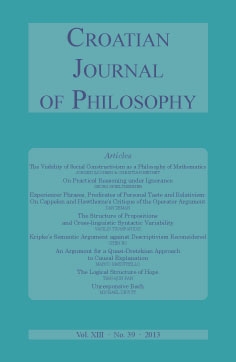Kripke’s Semantic Argument against Descriptivism Reconsidered
Kripke’s Semantic Argument against Descriptivism Reconsidered
Author(s): Bo ChenSubject(s): Philosophy
Published by: KruZak
Keywords: Kripke; the semantic argument; Assumption 1; Assumption 2; the sociality; intentionality; conventionality and historicity of language and meaning.
Summary/Abstract: There are two problematic assumptions in Kripke’s semantic argument against descriptivism. Assumption 1 is that the referential relation of a name to an object is only an objective or metaphysical relation between language and the world; it has nothing to do with the understanding of the name by our linguistic community. Assumption 2 is that descriptivism has to hold that, if name α has its meaning and the meaning is given by one description or a cluster of descriptions, the description(s) should supply a set of necessary and suffi cient conditions for determining what α designates; and that it is possible for us to fi nd out such a set of conditions. Emphasizing the sociality, intentionality, conventionality and historicity of language and meaning, this paper rejects Assumption 1, and argues that Assumption 2 is an unfair interpretation of descriptivism, and it is not necessary for descriptivists to hold Assumption 2. This paper fi nally concludes that Kripke’s semantic argument against descriptivism fails.
Journal: Croatian Journal of Philosophy
- Issue Year: XIII/2013
- Issue No: 39
- Page Range: 421-445
- Page Count: 25
- Language: English
- Content File-PDF

